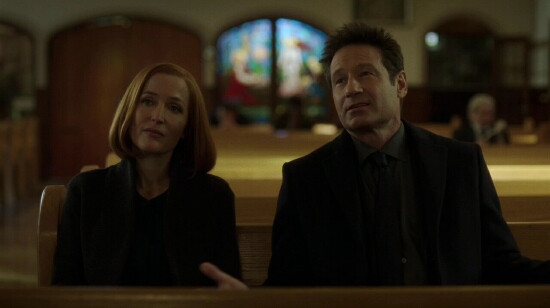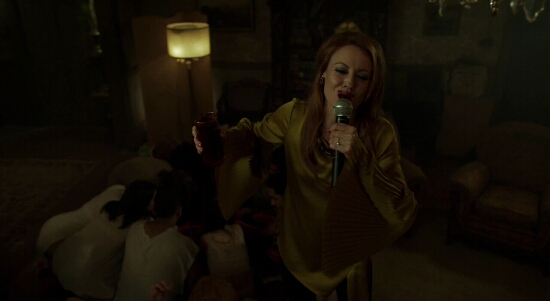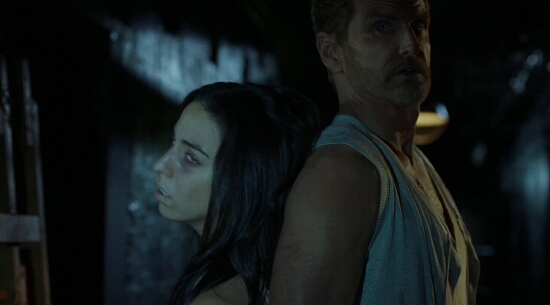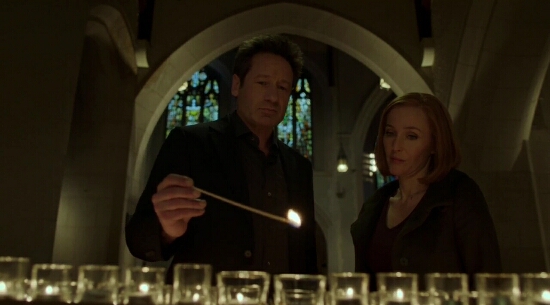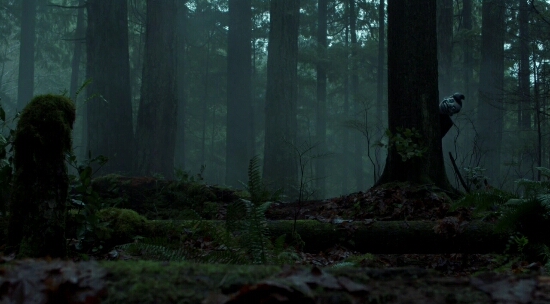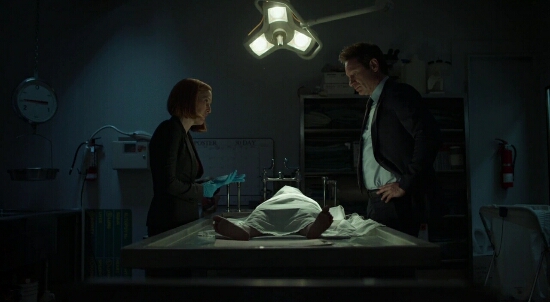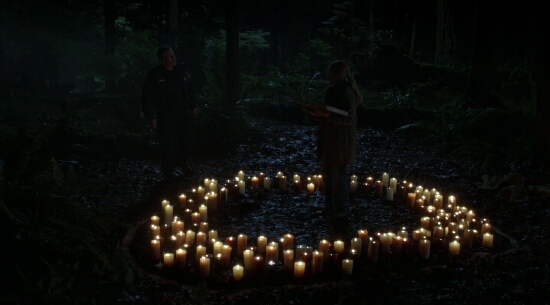My Struggle IV marks the end of a journey.
It is of course the end of this season, and as a cliffhanger it is calling for more to come; it is also the end of the 4-episode My Struggles arc of the revival (plus Ghouli, given its importance); it is highly likely, given Gillian Anderson’s declarations, that it is the end of Scully’s part in The X-Files; with such an uncertain future it could prove to be the end of the series. It is an unsatisfactory end to all of these possibilities.
There’s not much to say here really…
The end of the Struggles
Chris Carter announced several times that My Struggle IV comes to close the saga started with My Struggle I:
Reddit AMA: “The four struggle episodes were all pieces of a whole and Episode 10 completes the whole.”
TV Insider: “They really are four quarters of a whole. And I think that maybe threw some people at the beginning of last season, and even at the end of last season. But I think that you see, as you have seen, that they were puzzle pieces—four puzzle pieces to form a circle.”
E!Online: “I think that it will be satisfying for everyone, once they finish the finale, to go back and watch the four parts, the four puzzle pieces together. I think it will be a very satisfying miniseries within the series.”
From this perspective of an end of a four-episode saga, MSIV is completely random!
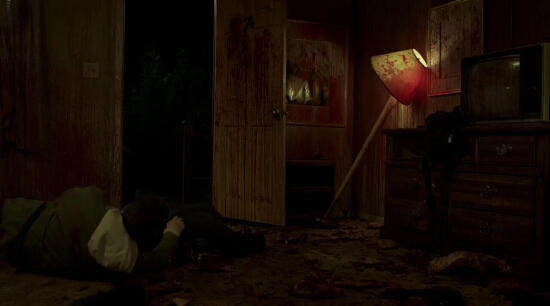
All the times reactions and reviews closed with “answers might come later”, MSIV was the one to have them, or not at all. The story of MSIV is extremely simple compared to its predecessors, it is just a manhunt.
Mr. Y and Erika Price are the two most definitive deaths in this episode, and this is very surprising given that the casting of these characters by two very interesting actors made me expect they would become the new recurring villains in any future season 12. Instead, they were given no character development; their plans were not expanded upon (we do see in MSIV some spacecraft and Purlieu services, confirming the information of MSIII and This); they are offed in a very expeditive manner. (Interestingly, Carter said he had initially seen Strughold for the role of Mr. Y, but I suppose the 90-year-old German Armin-Mueller Stahl was unavailable!)
MSII and MSIII, within their dialogue, set up the activation of CSM’s plans of a viral apocalypse in a future seen in visions by both Scully and William, and one would expect the finale to do something about it; MSIV just mentions the threat but delivers nothing on the visions. MSIII and This, within their dialogue, set up a confrontation of CSM and Mulder, where CSM was afraid that Mulder would kill him (the same CSM that survived a missile strike…); while Mulder did shoot CSM, the confrontation itself was just a shootout. MSIII, within its dialogue, also set up a Sophie’s Choice type of situation where Scully would have to choose between Mulder’s life or William’s life and joining the CSM’s side; nothing came out of that set up.
Furthermore, absolutely no answers are given to the issues raised by the Struggle episodes themselves, not just questions pending from seasons 1-9. For instance: why didn’t Scully directly start working on a vaccine with the knowledge she got from her visions (only her DNA was necessary)? what is the virus within a virus in the Spartan virus? how is the Spartan virus an alien pathogen when My Struggle II explained in detail how it works with CRISPR-Cas9? how did the CSM survive? why did the CSM’s appearance change from episode to episode (including between My Struggle I, which happened outside of Scully’s visions, and My Struggle III)? why were William’s stem cells important for saving Mulder, if after all he is not the father? why did the CSM consider the secret around William’s paternity a weakness?
(There is another This Man appearance here, on a billboard next to the sugar factory, making him present in nearly all of season 11. This is nothing more than an Easter Egg it turns out.)
Long story short, MSIV is more of another independent episode that doesn’t need much information on what came before, than a continuation of an arc — in the same way that MSI was essentially unnecessary to MSII, that MSIII erased MSII.
The end of a 25-year mythology: the old mythology and William
It is obvious that the original mythology of seasons 1-9 has been done away with, and it is illusory to expect any continuation or closure or answers to a number of lingering questions — the Black Oil, the Rebels, the Supersoldiers — nor any clarification further than the MSIII flashbacks, which can be read in both ways, as to how well this revival articulates with what came before — was the colonization threat a sham? has CSM’s Spartan virus plan existed since before the colonization threat went away? why doesn’t the Black Oil behave as before? All of this is dead and buried.
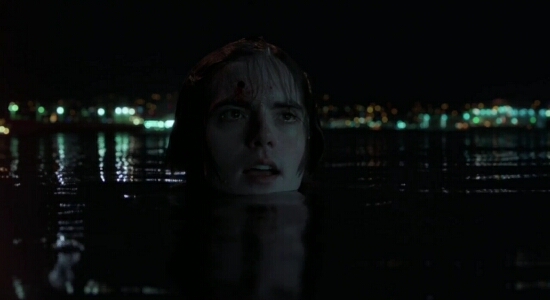
At least, we are given more background to William/Jackson in the traditional Struggle teaser. He lived a normal first five years (so Scully was right to give him up for adoption?) but then his powers kept developing and he became a criminal, a masterful liar and somewhat of an emotionless manipulator (and so Scully was not right to give him up?), who can also blow people up with psi powers, Scanners-like. All this builds him into this troubled teenager with supernatural powers that could be the focus of a monster-of-the-week episode (and indeed his trick with the lights that cause a traffic accident is reminiscent of 3X03: DPO!). William/Jackson is his own man, no longer wants anything to do with Scully or Mulder or the CSM, and although it would be interesting to see him again, it is just as well possible that Carter is done with him.
But the single and most important, essential, basic item we could have expected to have an answer about, something that has been an open issue since the year 2000, something teased at with that teenage boy in the credits of season 9, something that must be spelled out in order to make this whole story engaging and understandable, is the why of the importance of William. Apart from stating the fact that he is “the key”, or Mr. Y’s last words “Your son has what everybody wants, what people would kill to have“, there is nothing here apart from the same tease since season 8: why is he important to, well, everyone? The posts at ghouli.net suggest that he could be a weapon, and that “the cure is in the blood” (see analysis here). Does that mean that he can prevent or be used to prevent CSM’s plans somehow and save the world (tagline change: “Salvator Mundi“)? (however MSII suggested that any abductee like Scully, and at least CSM, Scully and Reyes should have the materials necessary to build a vaccine/cure against the Spartan virus) Does that mean he could be used as a weapon to any resistance to CSM’s plans? We don’t know.
William did help out, unwillingly, in having the CSM’s back turned so that Mulder could shoot him, and that’s it, but that’s far from the miraculous alien-supernatural importance conferred to him with the weight of four seasons’ mythology. At the end of the episode, William emerges from the water (in a scene echoing all the way back to Dr. Secare, a hybrid that could breathe underwater, in 1X23: The Erlenmeyer Flask!). William has been “downgraded” from being the center of the universe to another monster of the week that Mulder and Scully encounter and forget in the next episode.
The end of a character: Scully, William’s father and the new pregnancy
The CSM declares himself William’s “creator“, and indeed William’s visions with the CSM confirm that he is the father: “the truth can only come from my father, a man I’ve only seen in my visions, but who I know I already hate“. (Why then didn’t he blow him up when he had the chance the way he did with Erika Price?) Presumably the CSM is also the biological father and not just the abstract father-creator then, along with some alien DNA thrown in the mix (no double DNA as hinted at in ghouli.net, which let open the possibility that the father was Mulder and that the additional DNA was alien). Scully was an incubator, and we spend the whole of one minute on that as Skinner tells numb Scully all about it, and when later Mulder accepts that information when Scully shares it with him.
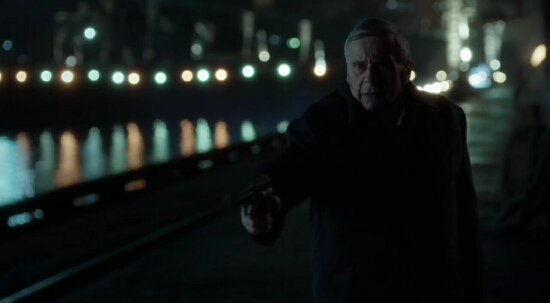
There is no reversal of the reveal in My Struggle III: Scully was indeed, again and again and again, the victim of experiments involving medical rape and her reproductive system. And so because of that, all of a sudden, one year of miraculous pregnancy, one year of stressful upbringing, and seventeen years of remorse at having given up William for adoption, including in the revival (Founder’s Mutation, Ghouli), are all swept away: Scully no longer cares about William. Apart from this being an insult at anyone that has adopted a child and has been able to genuinely love it independently of biology, it is also shoehorned in the story in a way that messes enormously with the way Scully’s character is represented. Scully cared more about Emily, clearly the result of an experiment, than for William, whom she carried and thought about for so long. Carter gives Mulder a hug and chat with William but denies any real meeting between Scully and William — something unimaginable in the emotional context of anything up to this episode, particularly since this is most likely Anderson’s last episode (another indication that Carter is done with William as a character?).
All because Scully has a new child coming. The weird dialogue and never-seen-before sex in Plus One was indeed foreshadowing: Scully is pregnant again! She is pregnant at 54 (not that this is unheard of, but she has not been shown actively trying to get the necessary medical assistance to conceive at that age) and very fertile given that her being barren was such a big part of her character story; there are no explanations given other than the prayers in Nothing Lasts Forever and, well, her alien DNA. The future Benjamin (Rachel’s second son) or Wilhelmina or Samantha is supposed to be consolation for the loss of William, both figuratively (Scully learns from Skinner that he was an experiment, and thus no longer her true son) and literally (Scully & Mulder think William is dead), which given how much emotional and mythological capital this series has spent on making William important, is crazy.
What is the point of doing that? If the series ends now, Carter has given Scully and Mulder a happy end similar to the end of season 8, with a child together, complete with Mark Snow’s reprise of the lovely “Surgery” track from I Want To Believe — at the cost of scrapping 18 years of William’s storyline, just because too many years have passed in the real world, with the third film or the revival taking so long to materialize, and Carter can no longer write them rejoining with William and raising him as a family. If the series continues, the new baby’s conception will again be a mystery to focus on, repeating the tired tropes of seasons 8 and 9. (Or, continuing the parallel with Rachel, Scully could die at childbirth of her second child!) Some placed Scully’s pregnancy as a “jump the shark” moment; this is that to the power of eleven.
The end of a show
On top of all things, MSIV includes the age-old season-ending intrigue of “they are closing the X-Files”, this time coming from Kersh, for reasons of FBI image, as Mulder and Scully’s theories and Mulder himself appear on Tad O’Malley’s conspiratorial show. Incidentally, the show has still to give any subtelty and shades of grey to Tad, a shame really given how much unsubtle credence and echo the show gave to his far-right-pleasing extreme theories during season 10. It’s unclear why it is so important that the X-Files would close, given how few actual FBI cases Mulder & Scully have investigated in this revival.
MSIV also features the death of Skinner and Reyes. Skinner’s death is the only new variation of the dubious ally/enemy trope this character has been trapped in since his conception, but his sacrifice comes at not such a big surprise. We were expecting more background on Reyes’s apparent deep change of character as presented in Scully’s visions in MSII; instead of that, we got a short and at the nick of time phonecall from Reyes to Scully that gets the story rolling, and that is all the redemption Reyes could get for herself in the ten-plus years she has apparently been working for the CSM. Even so, that redemption is ambiguous, as that phonecall gets Mulder in a situation where he could easily have been killed, and does not lead to William, it’s Scully’s search “on the web” and William’s ex from Ghouli (and her sister Maddie aka Duchovny’s daughter West!) that lead Mulder on his trail!
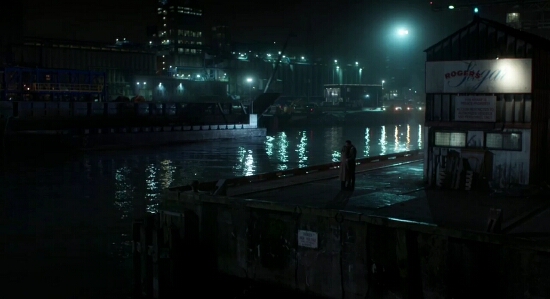
Some nice things can be said about MSIV, such as its very XF-like cinematography (dark and wet), its XF-like settings (the motel, the sugar factory, the pier), and its through-and-through better management of tension than MSIII. However, with the Struggle episodes, especially this season, Carter has turned The X-Files mythology into an action flick completely different from its atmospheric roots. Mulder is a Jack Bauer-like action hero who can take down trained professional soldiers, unfazed by the consequences of his unlawful actions; the “confrontation” with the CSM is a “shoot first ask questions later” type of situation. It is loud, fast, unsubtle, incoherent.
With no less than five deaths, unprecedented in the show, MSIV does away with nearly all the show’s side characters. MSIV blows up the show’s mythology, something Carter was in retrospect obviously fed up with, and clears the scene for something new and yet unknown to emerge in the future. It provides some sort of end point for the leads. There is actually a lot of closure in this episode, despite it being described as a cliffhanger.
But then Carter was quick to undo this closure in interviews, by pointing out how everything can be impermanent: none of the CSM, Reyes and Skinner’s deaths are confirmed; others could emerge from the depths of the neoSyndicate to replace Mr. Y and Erika Price; the Spartan virus and the aliens are still out there; Scully’s new baby’s conception is something to be explored…rince and repeat.
Given what he has done to the mythology of the show, to its central characters (particularly Scully), and to its visual/cinematic/editorial identity, I’m not sure I’m much interested in anything The X-Files that might come in the future any more.
No animals were blown up in the making of this review.






